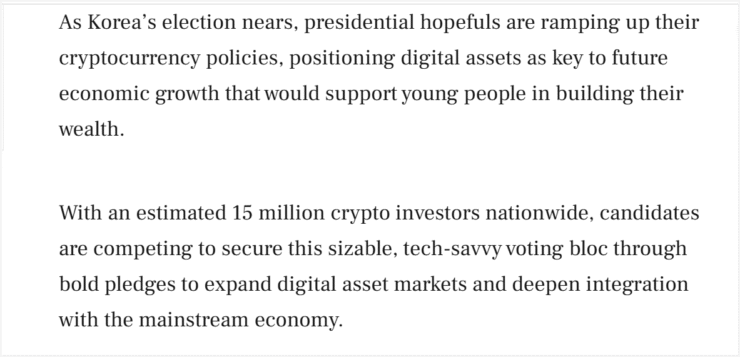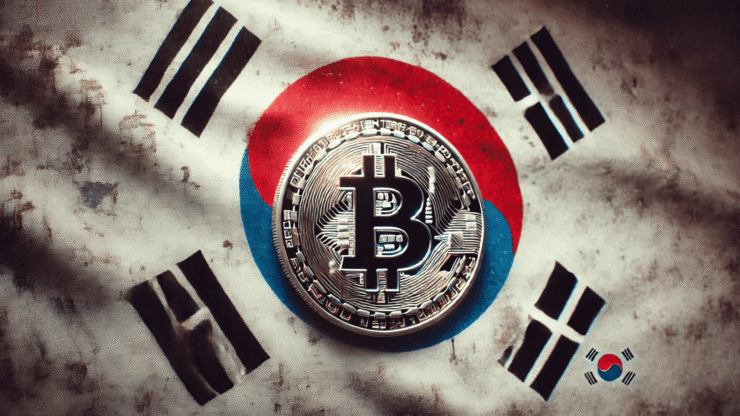Lee Jae-myung, the frontrunner in South Korea’s upcoming presidential election and leader of the Democratic Party, has proposed the creation of a Korean won-pegged stablecoin to protect national wealth and reduce reliance on foreign-issued digital currencies.
Speaking during a recent policy forum, Lee argued that the absence of domestic stablecoins has led to significant capital outflows via platforms dominated by U.S. dollar-based assets like USDT and USDC. According to data from The Korea Herald, local exchanges recorded over 56 trillion won (approximately $41 billion) in outbound transfers during Q1 2025—nearly half involving foreign stablecoins.
“We need to establish a won-backed stablecoin market to prevent national wealth from leaking overseas,” Lee stated.
Under current law, domestic stablecoin issuance is prohibited, a regulatory gap Lee aims to address through new legislation that would establish a digital financial framework anchored in the Korean won. The proposal comes amid growing global attention on the role of stablecoins in cross-border finance, prompting governments to assert more control over digital currency flows.

Lee Pushes Broader Crypto Reforms While Critics Raise Concerns
Beyond stablecoins, Lee has outlined a broad digital asset policy agenda, which includes legalizing spot crypto ETFs, permitting pension fund investments in crypto assets, and reducing transaction costs under strengthened regulatory oversight.
His main rival, Kim Moon-soo of the conservative People Power Party, has also endorsed legalizing spot crypto ETFs—signaling bipartisan support for integrating digital assets into the nation’s financial architecture.
Lee’s proposals go further, suggesting that institutional investors like the National Pension Fund be allowed to allocate capital into crypto once market volatility falls to manageable levels. To support this, his campaign is advocating for a real-time monitoring system to enhance transparency and mitigate systemic risk.
Still, not everyone is on board. Some economists warn that a government-sanctioned stablecoin could complicate monetary policy. Shin Bo-sung, a senior researcher at the Korea Capital Market Institute, cautioned that stablecoins—if issued or operated by private entities—could pose macroeconomic risks.
“Stablecoins are essentially another form of money creation,” Shin said.
“If left to private issuers, they risk inflating the money supply and weakening central control over economic levers.”
Democratic Party Forms Digital Asset Committee to Shape Policy
As part of its broader crypto push, South Korea’s Democratic Party has launched a new Digital Asset Committee tasked with shaping the nation’s legislative and regulatory framework for digital finance.
The committee held its first meeting on May 13 at the National Assembly Members’ Hall in Seoul, where lawmakers discussed a policy roadmap focused on closing legal gaps—particularly around stablecoins—and defining standards for crypto market participants. Leaders emphasized that regulatory clarity is essential for investor protection and innovation.
This latest committee joins a growing network of crypto-focused bodies, including the Financial Services Commission’s Virtual Asset Committee (formed in late 2024) and a longstanding public-private task force established in 2022. Together, these efforts reflect South Korea’s urgency to modernize its financial laws in step with blockchain technology.
One of the committee’s first major goals is to advance the Digital Asset Basic Act. The proposed legislation includes a licensing system for crypto issuers, a minimum reserve requirement of 50 billion won (approximately $36 million), and mandatory Financial Services Commission approval for all project launches.
Quick Facts
- Presidential candidate Lee Jae-myung has proposed a Korean won-backed stablecoin to reduce capital outflows and challenge foreign stablecoins like USDT and USDC.
- His broader crypto agenda includes spot ETF legalization, pension fund access to digital assets, and real-time risk monitoring systems.
- Critics warn that a national stablecoin could impact monetary policy, especially if operated by private issuers.
- The Democratic Party’s newly formed Digital Asset Committee aims to advance the Digital Asset Basic Act and establish clear regulations for Korea’s crypto sector.





